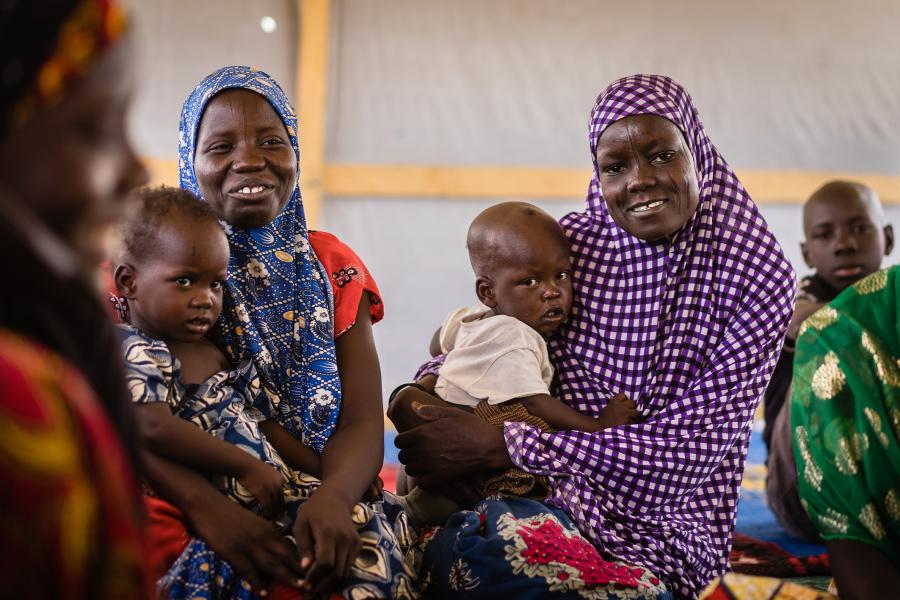In Chad, the Daresalam refugee camp hosts more than 5,000 refugees from Nigeria and Niger. Here, every individual has fled atrocities and violence that plague their countries. The camp’s school is the only place where Yande Tchari, 17 years old and in first grade, feels safe. “Only in class am I able to take my mind off things. School gives me the opportunity to learn always something new,” she says.
Yande carries her baby in her arms. Her white scarf with purple stripes covers her head completely, but reveals a pretty face marked by the hardships of life. Sitting on the floor next to her friend Yekaka Mahamadu and her baby Mariam, the two classmates and mothers seem much older than the others.
During recess, I approached the young mothers to get to know them. Yande used to live in Lelewa, an island of Lake Chad in the territory of Niger. In her village, as a 15-year-old girl, she was already ready to get married. “One night, my parents called me and they told me they were going to give me away in marriage to a fisherman called Kando. I’d never seen him or met him. Out of respect for my parents, I said nothing.” I asked her if she was happy on her wedding day, and she immediately replied, “My parents were happy. That’s what mattered.”
Yande then became pregnant and baby Alhadj was born a few months after their wedding. “Shortly after the birth, Kando was stopped by Boko Haram and killed because he refused to give up his belongings, his boat, a little money and all he’d been working for. Now, my son will never know his father,” she said with bitterness.
“A few days later, soldiers ordered us to quickly leave the village because Boko Haram was coming to kill us. I had just lost my husband and I had a baby in my arms. There were lots of us. The children were crying, and some of the mothers, too. Luckily, some soldiers spotted us and took us to the Daresalam refugee camp.”
At the camp, Yande reunited with Yekaka, her childhood friend from the same village. “My husband was also killed by Boko Haram. Our hardships have brought us together and we help each other out,” says Yekaka.
Yande’s curiosity drove her to enroll in school for the first time. “With my baby, I was hesitant to come to school, but the principal said that I could come to class with him. The first sentence in French that I learned was ‘Comment tu t’appelles?’ (What’s your name?),” says Yande, amused.
Recess was over and the children scrambled back into class. There are numerous challenges for teachers in these conditions: the classes are overcrowded, there’s a lack of educational materials, and for most of these children, it’s the first time they’ve had the opportunity to go to school.
After class, I found Yande again and asked her about her motivation to go to school. “I think that school can help women to become self-sufficient. If you didn’t go to school, you wouldn’t be here asking us questions, right? If I had the opportunity to go to school, I wouldn’t have married so young. I would be helping my family, and my mother would be proud of me. Today, school is what helps me forget all my worries,” she says.
While I was taking my notes, Yande took a piece of paper and a pen and started writing her first and last name, and helped Yekaka to do the same. “I think French language is very beautiful. You can learn a lot just by having fun. My son Alhadj will grow up to be a great writer. I’m going to teach him how to read and write,insh’ Allah (God willing).”
I spoke a great deal with the two young girls about many things: marriage, school and their plans for the future. To finish, Yande told me, “Some people make fun of me when I tell them I want to continue going to school, but for me, there’s no right age for school; what matters is your will.”
Aicha Chir Nour -- Editorial and Publication Officer with UNICEF Chad
Source: UNICEF
 FR
FR EN
EN AR
AR











